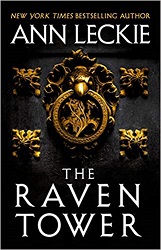
 The Raven Tower
The Raven TowerReviewed August 9, 2019, from a library book.
Orbit Books, 2019. 416 pages.
Starred Review
Oh, this book is amazing! I can’t expect anything traditional or stereotypical from Ann Leckie, but she still surprised me. I can tell you about the set-up, but not how everything comes together. Let me tell you that it does, and this book is well worth reading. This one’s fantasy, rather than the science fiction she’s written previously, but it breaks up expectations of the genre, just as her other books did with science fiction.
Here’s the first sentence:
I first saw you when you rode out of the forest, past the cluster of tall, bulge-eyed offering stakes that mark the edges of the forest, your horse at a walk.
At first, I thought this would be like The Fifth Season, by N. K. Jemisin, and take the entire book to let you know who is speaking to whom. But we do find out fairly quickly that the person being addressed is Eolo, the aide to Lord Mowat, who is the heir to the Raven’s Lease. Eolo and Mowat have arrived from the southern defenses on an urgent summons because the Instrument had died. Eolo is a wonderful and resourceful character who is also a transgender man (which barely comes into the story, but I did enjoy the representation).
Then the one speaking begins telling his story and we learn he is a god, a god who lives in a large stone that began under the sea. The god’s story takes a long time to intersect with the Raven god. (There’s a nice touch that this god has a friend who is a god that inhabits mosquitoes, called Myriad. I can believe in that god!)
But all is not well at the Raven Tower. The Instrument (a physical raven) is dead, and the previous Lease, Mowat’s father, should have sacrificed himself to the Raven god while the next Instrument is in an egg. But the former Raven’s Lease was nowhere to be found. His brother Hibal, Mowat’s uncle, has taken the Lease’s bench, because it could not remain empty. Mowat is still the Heir to the Raven’s Lease.
But Mowat does not believe this story. His father would never have fled. His father was committed to make the sacrifice. There are many complications, complications with other nations, complications with expectations of the way the Raven god works that don’t seem to be met, and complications with schemers and plotters.
Behind it all, we also get the epic and centuries-long story of the life of the Strength and Patience of the Hill. What is this god’s place in all this?
And yes, we grow fond of both Eolo and the Strength and Patience of the Hill as the story unfolds.
I don’t dare say much more at all, but the story is woven wonderfully. Here is a fantasy tale with nothing typical about it.
